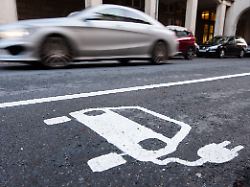sand in the gears
The German automotive industry will face these tasks in 2024
December 31, 2023, 2:08 p.m
Competition from China, high costs and now the abrupt end of e-car funding: Germany’s car industry is facing a huge upheaval. But the switch to e-mobility is progressing slowly. The recently canceled government purchase bonus for electric cars is likely to further impact the ramp-up. Added to this are geopolitical uncertainties and a weakening economy. Industry experts see sand in the gears and are expecting a challenging year ahead. Experts see these five challenges for the German auto industry in 2024:
1. China:
The position of the Germans in China is eroding to the extent that the change there towards e-mobility advances, says Fabian Brandt from the management consultancy Oliver Wyman. “It’s really alarming when you look at how differently the industry performs when it comes to combustion engines and electric cars,” says Brandt. The industry needs to act urgently; the main levers are attractive electric vehicles, significant cost reductions and a stronger focus on brand positioning. In the current structure, the business of German manufacturers is not sustainable without success in China.
According to industry expert Ferdinand Dudenhöffer, a decoupling from China would severely damage the German auto industry in the long term. China is the most important car market in the world and the innovation center of the car industry. “German car manufacturers are dependent on China and not the other way around,” says Dudenhöffer. The Stuttgart carmaker Mercedes-Benz, for example, sold more than a third of its cars in China in the first three quarters of the year. At its premium competitor BMW it was also a good third.
Volkswagen and its core brand were almost half that figure. “The Chinese used to copy us, now we have to copy them,” says Stefan Reindl, head of the Geislingen Institute for the Automotive Industry. The Chinese providers are much faster in development. The Germans were resting too much and “can’t get out of trouble.” You have to leave your comfort zone, says Reindl. The fact that German vehicles are among the best in the world is not a basic law.
2. Costs:
According to Brandt, German manufacturers need to improve their international cost competitiveness. In aggressive price competition you need more room for maneuver. Accordingly, costs would have to be reduced on average by at least 3,000 to 4,000 euros per vehicle – and significantly more for electric cars. But after the end of the e-car bonus, the burden on companies is even increasing. Several manufacturers announced this week that they would at least temporarily cover the state share of the purchase premium that has now been eliminated. The federal government actually wanted to grant a purchase bonus for new cars of up to 4,500 euros by the end of the year. In addition, there was a half allowance from the manufacturer, i.e. up to 2250 euros. On January 1, 2024, the state premium should be reduced to 3,000 euros and then expire at the end of 2024.
In recent years, manufacturers have done good business despite the crisis, which they tried to secure, says Brandt. “A strong cost focus and resilience are often at odds with each other.” Instead of saving money on procurement, manufacturers should also pay attention to their personnel costs and “streamline” them, advises Brandt.
This is already becoming concrete in some places: After months of struggle with the works council, Volkswagen this week agreed on the key points of a billion-dollar savings program. The core Volkswagen brand’s personnel costs in the administrative area are expected to fall by 20 percent, but there will be no redundancies for operational reasons, the company said. There should be significantly greater savings in material and fixed costs.
3. Software:
Software in cars will become increasingly important in the future, be it for assistance systems when driving or infotainment (entertainment or information), for example. The manufacturers suspect a billion-dollar business here.
The still weak position of German manufacturers in the software sector is putting a strain on business and, according to Brandt, is increasingly becoming a decisive competitive disadvantage compared to Tesla and Chinese providers. The industry must now deliver, including with technology partners who can demonstrably do certain things better. However, the manufacturer must maintain a clearly recognizable position with the end customer. For example, if the display looks like Apple, then the manufacturer has lost the customer. “Then it’s just a wheeled vehicle.”
Constantin Gall, automotive expert at the auditing and consulting company Ernst & Young (EY), also sees a personnel problem in the software sector. The software departments of the major manufacturers are “actually in shambles at the moment.” Agile structures are needed for these tasks, but many managers find this difficult.
4. Raw materials:
Gall sees recycling as one way to reduce dependencies on other countries for raw materials for electric car batteries. Manufacturers could extract a large portion of the materials from older battery generations and put them back into new batteries. However, the prerequisite is that they seriously focus on the circulation of resources and consistently invest in these technologies. “There is a threat of significant consolidation.”
5. Suppliers:
According to Brandt, many suppliers are in a critical situation after the crises of recent years and with the switch from combustion engines to electric motors. The increased interest rate level is also making business more difficult. “There is a threat of significant consolidation in the supplier landscape that is highly relevant to the car location,” says Brandt. What is needed is a model that is more focused on partnership between suppliers and car manufacturers. The innovative strength of the location is also dependent to a large extent on the suppliers.
